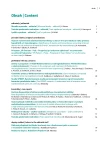-
Medical journals
- Career
Rare diagnostics of infective endocarditis after kidney transplantation
Authors: Ivana Dedinská 1; Petra Skalová 1; Michal Mokáň 2; Katarína Martiaková 2; Denisa Osinová 3; Miroslav Pindura 1; Blažej Palkoci 1; Marián Vojtko 4; Janka Hubová 4; Denisa Kadlecová 4; Ivona Lendová 4; Radovan Zacharovský 5; Filip Pekar 5; Lucia Kaliská 6
Authors‘ workplace: Chirurgická klinika a transplantačné centrum JLF UK a UN Martin, Slovenská republika 1; I. Interná klinika JLF UK a UN Martin, Slovenská republika 2; Klinika anestéziológie a intenzívnej medicíny JLF UK a UN Martin, Slovenská republika 3; Dialyzačné stredisko B. Braun Avitum, s. r. o., Trstená, Slovenská republika 4; Stredoslovenský ústav srdcových a cievnych chorôb, a. s., Banská Bystrica, Slovenská republika 5; Agel diagnostic, a. s., Banská Bystrica, Slovenská republika 6
Published in: Vnitř Lék 2016; 62(1): 48-51
Category: Case Reports
Overview
Introduction:
Infective endocarditis in a patient after kidney transplantation is a serious infective complication which increases the risk of loss of the graft and also the mortality of patients. The most important predisposing factor is the immunosuppressive therapy – mainly induction immunosuppression.Material and case description:
250 patients underwent kidney transplantation throughout the period of 12 years in the Transplant Center Martin. This set of patients included 5 patients (2 %) after heart valve replacement. We present the case of a patient after kidney transplantation with development of endocarditis of the bioprosthesis of the aortic valve one month after successful kidney transplantation. Diagnostics of endocarditis by standard procedures (examination by transthoracic echocardiogram, transesophageal echocardiography, hemocultures) was unsuccessful. We rarely diagnosed endocarditis only by PET-CT examination with a consequent change of the antibiotic treatment and successful managing of this post-transplant complication.Conclusion:
Endocarditis after kidney transplantation is a serious complication which significantly worsens the mortality of patients. The risk of development of infective endocarditis after transplantation is also increased by induction, mainly by antithymocyte globulin. Diagnostics only by PET-CT examination is rare; however, in this case it fundamentally changed the approach to the patient and led to a successful treatment.Key words:
endocarditis – induction – kidney transplantation – PET-CT
Sources
1. Miklušica J, Grandtnerová B, Grendár J et al. Príčiny neidentifikovania darcu orgánov. Orgánové transplantácie 2005; 1(2): 8–9.
2. Dedinská I, Galajda, P, Laca Ľ et al. Imunosupresia a novovzniknutý diabetes mellitus po transplantácii obličky. P + M: Turany 2014. ISBN 9788089694082.
3. Grandtnerová B, Laca Ľ, Gábor D et al. Folic acid supplementation and homocyst(e)ine level in renal transplant recipients. Transplant Proc 2001; 33(1–2): 2049–2050.
4. Viklický O, Janoušek L, Baláž P. Transplantace ledviny v klinické praxi. Grada: Praha 2008 : 223–224. ISBN 978–80–247–2455–3.
5. Žilinská Z, Chrastina M, Trebatický B et al. Vascular complications after renal transplantation. Bratisl Lek Listy 2010; 111(11): 586–589.
6. KDIGO clinical practice guideline for the care of kidney transplant recipients. Am J Transplant 2009; 9(Suppl 3): S1-S155.
7. Einollahi B, Lessan-Pezeshki M, Pourfarziani V et al. Does CMV infection increase the incidence of infective endocarditis following kidney transplantation? Ann Transplant 2009; 14(1): 32–37.
8. Martin-Davila P, Fortun J, Navas E et al. Nosocomial endocarditis in a tertiary hospital: an increasing trend in native valve cases. Chest 2005; 128(2): 772–779.
9. Miro JM, del Rio A, Mestres CA. Infective endocarditis in intravenous drug abusers and HIV-1 infected patients. Infect Dis Clin North Am 2002; 16(2): 273–295, vii-viii.
10. Shroff GR, Skeans M, Herzog CA. Outcomes of renal transplant and waiting list patients with bacterial endocarditis in the United States. Nephrol Dial Transplant 2008; 23(7): 2381–2385.
11. Horstkotte D, Follath F, Gutschik E et al. Guidelines on Prevention, Diagnosis and Treatment of Infective Endocarditis. The Task Force on Infective Endocarditis of the European Society of Cardiology. Eur Heart J 2004; 25(3): 267–276.
12. Issa NC, Fishman JA. Infectious Complications of Antilymphocyte Therapies in Solid Organ Transplantation. Clin Infect Dis 2009; 48(6): 772–786.
13. Moshkani Farahani M, Rostami Z, Einollahi B et al. Infective Endocarditis After Renal Transplantation. Nephrourol Mon 2014; 6 (1):e12326. Dostupné z DOI: <http://dx.doi.org/10.5812/numonthly.12326>.
14. Graziosi M, Nanni C, Lorenzini M et al. Role of 18F – FDG PET/CT in the diagnosis of infective endocarditis in patients with an implanted cardiac device: a prospective study. Eur J Nucl Med Mol Imaging 2014; 41(8): 1617–1623.
15. Saby L, Laas O, Habib G et al. Positron Emission Tomography/Computed Tomography for Diagnosis of Prosthetic Valve Endocarditis: Increased Valvular 18F-Fluorodeoxyglucose Uptake as a Novel Major Criterion. J Am Coll Cardiol 2013; 61(23): 2374–2382.
16. Sabol F, Jakubová M, Kolesár A et al. Recidivujúca protetická endokarditída u 21-ročného pacienta s transplantovanou obličkou riešená alogénnym homograftom. Vnitř Lék 2012; 58(6): 494–498.
Labels
Diabetology Endocrinology Internal medicine
Article was published inInternal Medicine

2016 Issue 1-
All articles in this issue
- Significance of alanine aminotransferase screening in blood donors for risk reduction of hepatitis B and C transmission by haemotherapy
- “3P (Patient-Pulse-Prognosis) in heart failure” survey: focus on heart rate
- Changes in the prognosis and treatment of Waldenström macroglobulinemia. Literature overview and own experience
- Gene mutations connected to Waldenstöm macroglobulinemia
- The SPRINT Research. A Randomized Trial of Intensive versus Standard Blood-Pressure Control
- Rare diagnostics of infective endocarditis after kidney transplantation
- A rare case of mobile atherosclerotic plaque with a high embolic potential in the femoral artery
- Dangerous cucumbers – Leyll’s syndrome
- Toxic epidermal necrolysis
- EASD Postgraduate Course of Clinical Diabetes and its Complications, Prague 2015
- Internal Medicine
- Journal archive
- Current issue
- Online only
- About the journal
Most read in this issue- Toxic epidermal necrolysis
- Changes in the prognosis and treatment of Waldenström macroglobulinemia. Literature overview and own experience
- Significance of alanine aminotransferase screening in blood donors for risk reduction of hepatitis B and C transmission by haemotherapy
- Gene mutations connected to Waldenstöm macroglobulinemia
Login#ADS_BOTTOM_SCRIPTS#Forgotten passwordEnter the email address that you registered with. We will send you instructions on how to set a new password.
- Career

